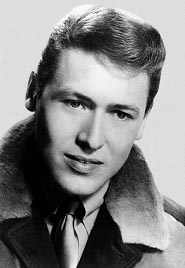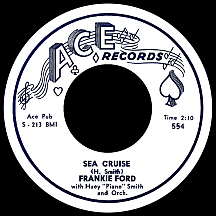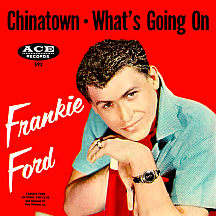FRANKIE FORD
Sea Cruise
Elvis Presley delivered tenfold on Sam Phillips' theory that a white singer who sounds black could make him a million dollars (though he sold himself short on the amount, relinquishing Presley's Sun contract to RCA Victor for a mere 35 thousand). After that, competitors were constantly on the lookout for someone with similar chops. Ace Records owner Johnny Vincent felt Francis Guzzo filled the bill; he had teen idol looks and his Italian-American heritage was a bonus, as that seemed to be the profile of so many new singers in the late '50s.
Born in Gretna, Louisiana, just across the Mississippi River from New Orleans, Francis (nicknamed Frankie) had a natural desire to perform as early as age five, acting up for anyone who would watch him sing and dance (his adoptive parents paid for lessons). He sometimes performed in public and at one point appeared with Sophie Tucker at the Roosevelt Hotel's Blue Room on Baronne Street. In 1952, at age 12, he won several local talent contests, eventually finding himself in New York for an installment of Ted Mack's Original Amateur Hour; he sang Kay Starr's signature tune "Wheel of Fortune" on the ABC-TV show. The scuttlebutt on young Guzzo was that he preferred the decadent sounds that were wafting across from the other side of the river: the music of Fats Domino, Professor Longhair and the like, the Crescent City piano men harbored in those fascinating smoke-filled nightclubs just a few miles from his home.
While attending high school at Holy Name of Mary, just up the road in Algiers, he played piano and sang in a group called The Syncopators. Guzzo and the guys hung around the New Orleans clubs whenever possible, usually getting the boot because they were underage, or because they were white, but it didn't phase Frankie, who made friends with Clarence "Frogman" Henry, who gave him tips on how to dominate those 88 keys. Before long he was firmly anchored in local rhythmic technique.
At 18, Frankie began playing in the clubs and met Joe Caronna, a local record hustler who became his manager and introduced him to Vincent at Ace's headquarters in Jackson, Mississippi, about 200 miles north of the city. Vincent suggested a name change to the catchier Frankie Ford and shortly afterwards the young key-pounder's career was launched at Cosimo Matassa's New Orleans studio where he cut his first record, "Cheatin' Woman," with hitmaking pianist Huey "Piano" Smith, saxophonist Alvin "Red" Tyler, bassist Frank Fields and other seasoned black musicians who would back him up on most of his recordings for Ace. The next single was "Roberta," recorded by Huey Smith and his group The Clowns as "Loberta" (after the girl in the lyrics of Professor Longhair's "Tipitina"). This song, with Ford's vocals dubbed over Huey's original backing track ('Loberta' intact despite the adjusted title), had the goods to be a hit: 'I ain't mad at you, don't be mad at me!' sounded like nothing the Italian kids in Philly were putting out, but the two minute rocker was passed over when its flip side began to take off.
Huey wanted "Sea Cruise" for himself (he had written it) but Vincent convinced him to let Frankie take a stab at it. The vocals for this side ('I got the boogie woogie like a knife in the back...') were also dubbed over the original Clowns track, with clanging bell and big foghorn sound effects added to the hot sax, piano and drums. Local stations played around with it, but when WLAC in Nashville hit it heavy the record took off, landing Frankie on Dick Clark's American Bandstand, after which any hopes of "Roberta" being a hit were set adrift. "Sea Cruise" went top 20 nationally in March of '59, setting 19-year-old Frankie off on several months of nearly nonstop stage shows across the U.S., appearing in a flashy red sequined jacket his mother had made for him; he asserted his own teenage R&B personality and rocked with the best of them.

Labelmate Jimmy Clanton, Vincent's other singer molded as a teen idol, immediately sought to exploit the maritime topic with "Ship on a Stormy Sea" but had no luck, nor did Frankie have much success when it came to following his big hit. "Alimony," a cleverly twisted tug-of-war between a monkey and a billy goat (cowritten by Caronna, Ford and Smith), barely dented the charts in August. But he didn't let the disappointment take the wind out of his sails, getting weirder with the next release, a one-off incognito single on Vin (an Ace subsidiary named after its owner) that teamed him with Mac Rebennack (the tireless Dr. John) and Jerry Byrne. "Morgus the Magnificent," credited to Morgus and the Ghouls (3 Ghouls on some pressings), paid homage to a local WWL-TV (channel 4) monster movie show, House of Shock, and its host Morgus (a persona played to the hilt each week by Sid Noel). A minor Orleans hit, the song had no relevance to anyone who lived outside Louisiana.
"Time After Time," a Jule Styne-Sammy Cahn standard from 1947, threw everyone for a loop in early 1960. Frankie had decided to be a big band-style crooner? Likely inspired by Bobby Darin's success with "Mack the Knife," the song actually had a better showing on the charts than the previous two efforts. He couldn't make the ploy strike twice, though: "Chinatown" (written 50 years earlier by William Jerome and Jean Schwartz as "Chinatown, My Chinatown") got the cold shoulder treatment. Frankie needed to get back to Big Easy basics. Lew Chudd made him an offer to sign with Imperial Records, convincing him that Vincent was too busy with his other acts like Smith and Clanton, who was having a better run on the charts. Also, Chudd dangled a couple of incentives in the form of a nice cash advance, more than he'd been getting with Ace, and something even better: a chance to work with Dave Bartholomew, the mastermind behind a thick stack of top-selling Fats Domino records. Frankie had no trouble jumping ship and joining Imperial!
For his debut with the new label, Ford filched local singer Joe Jones' "You Talk Too Much" and spent a few weeks on the charts that fall, though Jones' version rightfully dominated. His third Imperial single, "Seventeen" (a remake of Boyd Bennett's 1955 hit), spent a few weeks on the charts in the spring of '61. He continued writing songs with his Ace cohorts Huey Smith and Joe Caronna, but after three more releases he was dropped by Imperial in early '62. The U.S. Army drafted him at about the same time and for most of his three year tour he performed with a Special Services outfit in the U.S. and Asia. Frankie spent a month in Vietnam doing two shows a day with nothing more than his piano and singing voice, a one-man act and big hit with fellow soldiers.
Frankie returned to his home town in early 1965. His career went fore and aft for the rest of the decade and into the '70s with mostly nightclub work and occasional singles on a number of small labels. He played himself (ideal casting!) in the 1978 rock and roll film about the life of Alan Freed, American Hot Wax. For the last few decades his nickname has been "The New Orleans Dynamo," after the title of an album he recorded in England in '84. The wild party atmosphere Frankie Ford invoked on that 1959 "Sea Cruise" served him well throughout his nearly-six-decade career.



